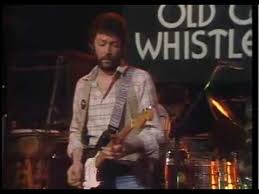Hello again! Fresh from my emergency Ella Fitzgerald post, we have something a little more Seventies for your hopper this afternoon, starring one of the most popular and revered musicians of the last 50 years.
2017 is the 40th anniversary of one of the truly pivotal years in music, and we're gonna have a whole bunch of 40th anniversary postings to mark the anniversaries of some truly essential and iconic shows. Today's fare is just such a commemoration of just such a legendary performance, unissued for decades outside of a long-dead video format.
That year was a little bit of everything, with Progressive Rock, Blues, Punk, Reggae, Jazz Fusion and a host of other shadings enjoying a kind of simultaneous heyday. It was in that environment that forty years ago tonight, a struggling and fairly intoxicated Eric Clapton appeared with his band on one of the mega-tremendous TV programs of the 1970s, itself the only time he ever appeared on that fantastic and quintessential show.
In the mid-1970s he was trying to get off of heroin and turned to alcohol to fill the gaping void left by the deification he experienced in the 1960s ("Clapton is God," read the graffiti) and the realization he was nowhere near the status people had conferred upon him as a guitar player and songwriter, much less a human being.
Coaxed back to music in 1973 by a host of muso pals after several years in a drug-fueled hiatus, he spent the middle part of the decade in a drunken stupor, trying to dull the twin pains of addiction and expectations. He had plenty of commercial success during that time, but very little peace of mind. In retrospect, he was extremely lucky to have survived the decade.
None of this prevented him from delivering a burning hour of Blues Power, however, and on April 26, 1977 he took the stage at the BBC with an eight piece band in front of a receptive audience. As it turned out, he came up with one of the most consistently interesting and corset-tight sets the show had ever seen.
I'm not gonna lie: he's so sloshed he can't even pronounce backup singer (and soon to be disco diva) Yvonne Elliman's name. Somehow, though, he manages to play his ass pretty much clean off, starting on acoustic and proceeding to his trademark electric excursions.
Now, a lot of this and why I'm sharing it has to do with The Old Grey Whistle Test, itself possibly the finest and most beautifully filmed music television program of the Seventies. Entire episodes in pristine quality are hard to come by, and this one hasn't seen the light of day since a gray-area Japanese laserdisc of it was issued in the mid-1980s. Today's PAL DVD is sourced from precisely that long out-of-print item and is indistinguishable from a legitimate release.
This is a fascinating document of a performer on the edge, not sure how to make it through without destroying himself, and for this reason it makes for subtly gripping TV. Honestly the best part when you watch it is the knowledge that he did make it, and didn't end up in an early and ignominious grave from drink-n-drugs, like so many of his contemporaries.
Eric Clapton
Old Grey Whistle Test
BBC-TV Theatre
London, UK
4.26.1977
Old Grey Whistle Test
BBC-TV Theatre
London, UK
4.26.1977
01 Hello Old Friend
02 Sign Language
03 Alberta, Alberta
04 Tell the Truth
05 Can't Find My Way Home
06 Double Trouble
07 I Shot the Sheriff
08 Knocking On Heaven's Door
09 Further Up the Road
10 Badge
02 Sign Language
03 Alberta, Alberta
04 Tell the Truth
05 Can't Find My Way Home
06 Double Trouble
07 I Shot the Sheriff
08 Knocking On Heaven's Door
09 Further Up the Road
10 Badge
Total time: 59:52
Eric Clapton - vocals & guitar
Dick Simms - keyboards
Jamie Oldaker - drums
Sergio Pastora - percussion
George Terry - guitar
Carl Radle - bass
Yvonne Elliman - vocals & guitar
Marcy Levy - vocals, guitar & harmonica
Dick Simms - keyboards
Jamie Oldaker - drums
Sergio Pastora - percussion
George Terry - guitar
Carl Radle - bass
Yvonne Elliman - vocals & guitar
Marcy Levy - vocals, guitar & harmonica
PAL DVD of the mid-1980s laserdisc
2.1 GB/April 2017 archive link
Clapton is extremely generous here, giving lead guitar time on the first couple of tunes to his cohort George Terry and letting Yvonne Elliman sing lead midway through the hour. If you are at all interested in him this is something of a Holy Grail, featuring him in a sort of frail-but-fiery position and providing a unique insight into his career trajectory and the self-destructive bumps along the way.
Anyway that's enough putrid punditry from me... pull it down and enjoy yourself an hour of Slowhand gestures from one of the acknowledged masters, and I'll return sooner than later with the May 1977 motherlode! Blues Appetit everyone.--J.




























































